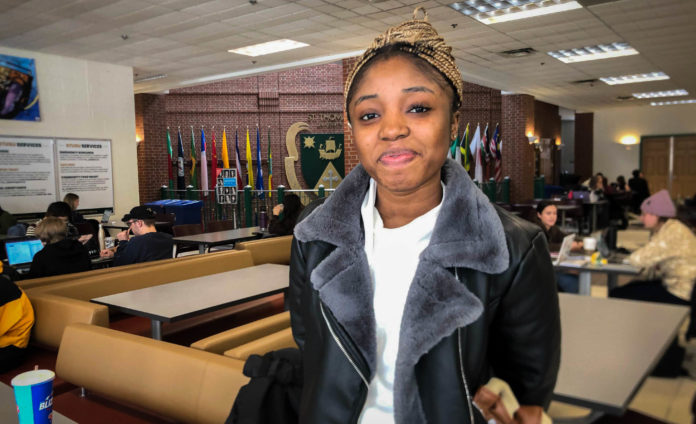

February marks Black History Month. While the world celebrates and learns about Black history, what do Black students from St. Thomas University think?
The Aquinian’s features editor, Jacob Moore, spoke to members of STU’s Black student community to get their stories and understand what Black History Month means to them.
Tishe Oduntan is an international student from Nigeria, pursuing a double major in communications and public policy and digital media.
Oduntan loves writing.
“I spend most of my time in a coffee shop, trying to figure out what to write, just trying to relax and reading books,” said Oduntan.
Oduntan took a script writing course back home in Nigeria a few years ago because she likes writing stories, her favourites being comedies, romances and family dramas.
On top of writing, Oduntan runs a cruelty-free lip gloss and lipstick brand with her sister.
Oduntan said that beauty products can cost a lot in Nigeria.
“We want to make sure that every girl can be able to afford lip gloss and to feel pretty inside and outside,” she said.
When Oduntan thinks of Black History Month, she thinks of Black icons, like Michelle and Barack Obama, Chimamanda Adichie, Davido and more.
“I wouldn’t say [Black History Month] is to celebrate a couple different people; it’s to celebrate every single Black person, every single person of colour,” she said.
Pearl Gyamfi is from Ghana. She studied in the International Baccalaureate diploma program before coming to STU to study criminology.
“I studied the criminal justice system in my country and how it relates to women and kids,” she said. “For women, you can go steal a [menstrual] pad and you’re in jail for like five years.”
Gyamfi wants to use her criminology degree to attend law school and eventually help the women from Ghana who, she said, are disadvantaged in Ghana’s patriarchal society.
Gyamfi also writes poetry, paints and practices photography. Her favourite thing to do on a Saturday is to paint random things on a blank canvas.
“I don’t even know the first thing about painting; I just like the ability to express myself and put all your emotions into something beautiful,” she said.
Gyamfi likes photography for a similar reason, explaining that when she sees something she likes, she captures it in a photo.
“Every time I look, I want to see what you were seeing at the time you took that picture,” she said.
Gyamfi watches spoken word poetry on YouTube. One of her favourite channels, Def Jam, speaks “radical truth.”
“It’s like wrestling came together with words,” she said.
When asked about Black History Month, Gyamfi said anyone born in February is a legend, and she, too, was born in February, joining American abolitionist Frederick Douglass and United States President Abraham Lincoln. Gyamfi said their work contributed a lot to Black history.
She also named other notable figures, like Kimberlé Crenshaw, Shelly-Ann Fraser-Pryce, Yara Shahidi and Megan Thee Stallion.
“They are great Black icons,” Gyamfi said. “They are worth celebrating.”
She added that in February, the whole world turns its spotlight on Black people to celebrate their accomplishments.
She feels happy to be finally recognized.
“We want to see our faces on somebody’s school poster saying, ‘Thank you for all you do for the Black community,’” she said.
Chaunté Blackwood, a first-year STU student, is from Jamaica. She’s considering studying criminology to become a lawyer so that she can understand why there is so much crime back home.
Although she studies criminology, her passion is poetry, and she wishes she could be a fantasy writer.
“[Poetry] gives me a good handle on humans and their emotions,” Blackwood said.
She appreciates the niche of African literature. She likes how it blends mythology and history together so beautifully.
When Blackwood thinks of Black History Month, she remembers the national heroes of Jamaica, like Marcus Garvey, because she’s only really experienced Black History Month there.
She said one of her favourite quotes comes from Garvey, who was a Jamaican activist: “Do not remove the kinks from your hair; remove them from your brain.”
Blackwood said that this is a reference to women straightening their hair “in order to assimilate into the wider context in which they were living.” Garvey means that these women should liberate themselves and liberate their minds.
For Blackwood, Black History Month means she is no longer bound by the same constraints people faced in the past.
“Maybe 100 years ago, I wouldn’t have the freedom to pursue post-secondary education outside of my country or in my country,” she said.
“The present being what it is, I have the opportunity to do that and more.”
